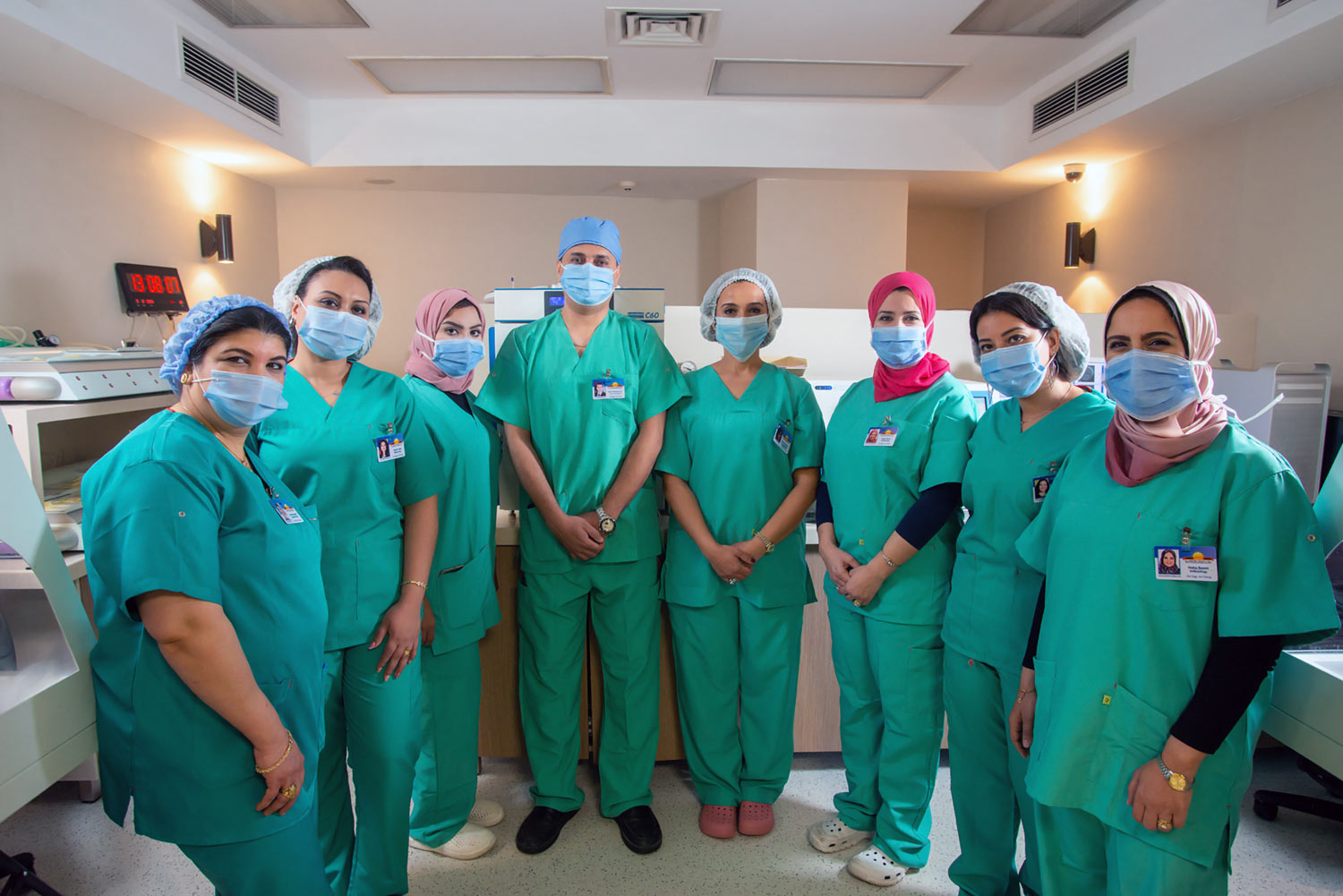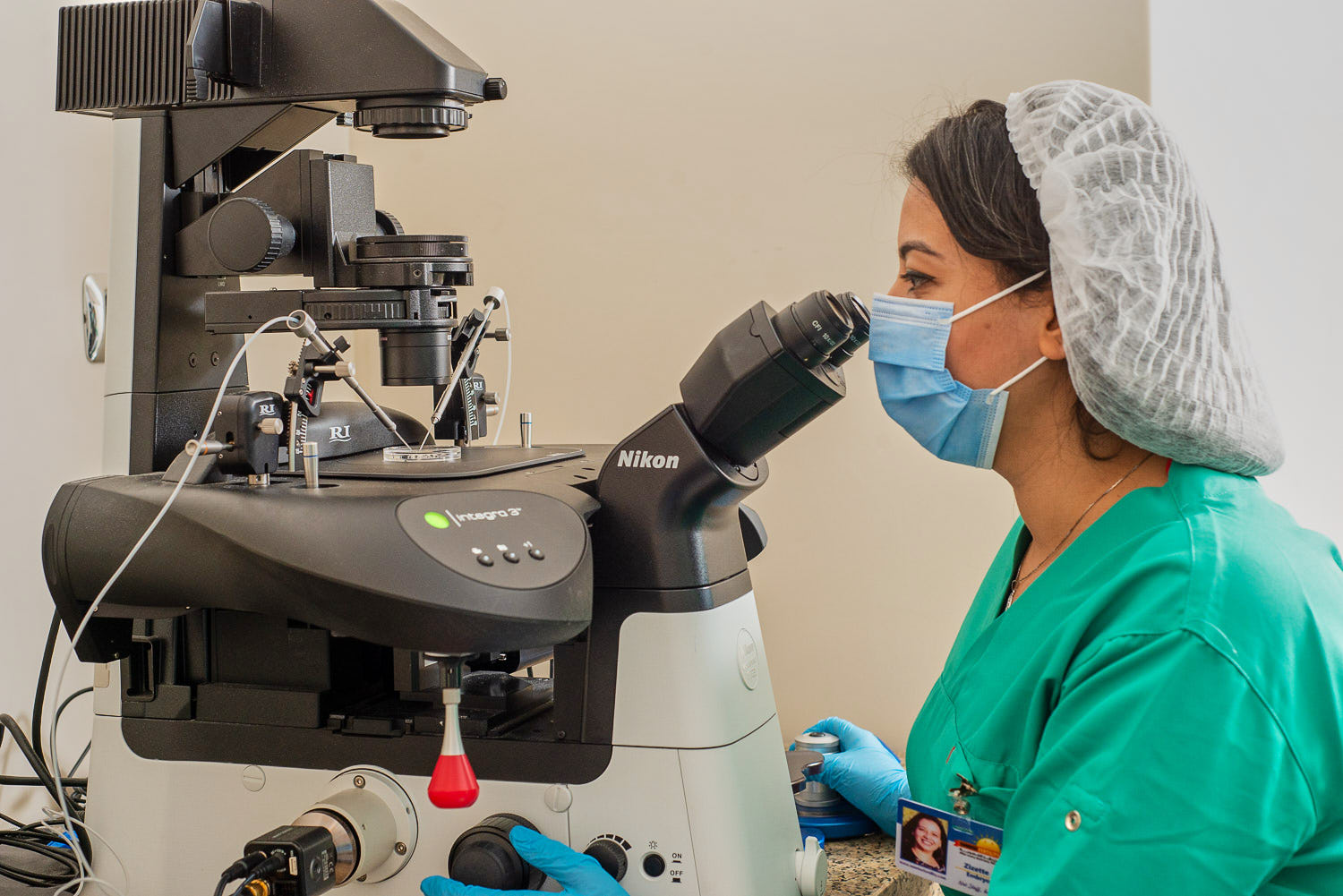IVF (In-vitro Fertilization)
IVF (In-vitro Fertilization)
In Vitro Fertilization – IVF
IVF is one of the most important assisted reproductive technologies that has helped fulfil the dream of having a child for many couples facing difficulty in fulfilling their dream of starting a family.
What is the IVF technique?
IVF is a modern fertility technique that involves collecting eggs and sperm from both partners, fertilizing the eggs outside the uterus in a laboratory, and then implanting the fertilized embryos in the mother’s uterus.
What are the tests required before the IVF procedure?
Each couple undergoes a series of medical tests before the IVF procedure to ensure that they are fit for the procedure. The tests required before IVF include:
- Hormone testing.
- Semen analysis.
- Uterus and fallopian tubes examination.
- Blood tests.
- Allergy tests.
Tips for women before IVF:
- Relax and avoid stress as much as possible to improve your chances of success.
- Eat foods rich in important nutrients to promote a healthy body and increase the chances of conception.
- Avoid exposure to toxins and harmful chemicals, such as nail polish, cosmetics, and harsh cleaning materials.
- Cooperate with the medical team and adhere to their instructions to ensure the maximum benefit from the procedure.
You can contact us on WhatsApp to find out more about IVF 01200682828
Tips for men before IVF procedure:
It is recommended to follow some practices that will maintain sperm health, such as:
- Eating a healthy diet.
- Exercise.
- Get enough sleep and regulate your sleep schedule.
Stay away from the habits that can negatively affect them, such as:
- Smoking.
- Drinking alcohol.
- Excessive stress.
How long does an IVF procedure take?
The duration of an IVF procedure varies depending on the case and the type of protocol that is followed:
Protocols:
- Long Protocol.
- Short Protocol.
- Anti-Protocol.
- The protocol choice varies from one patient to another, depending on the hormonal profile and clinical data.
- In the long protocol (starting on day 21), ovarian suppression in the woman begins on day 21 of the menstrual cycle (i.e., before menstruation) using specific injections. While in the short protocol, suppression must begin on day 1 of the cycle. In the anti-protocol, suppression is not performed.
- Transvaginal ultrasound is performed for the baseline scan on days 4-5 of the cycle (in the long protocol) or days 2-3 (in the short or anti protocols).
- Ovarian stimulation begins with daily HMG/rFSH, and ultrasound scans are performed regularly to assess follicular size growth in response to the stimulants.
- When the follicles mature, ovulation is stimulated by the human chorionic gonadotropin hormone (HCG).
- After 34 to 38 hours, egg retrieval is performed. On the same day, the man is given a sterile container to collect a semen sample (after abstaining from ejaculation for 4–5 days). The woman is then transferred to the operation room, where the eggs are retrieved vaginally under ultrasound guidance using sedation or light anesthesia. The procedure takes 15 to 30 minutes maximum, and the patient can leave the center about an hour after full recovery.
- On the same day, embryologists will work on the retrieved eggs with the husband’s sperm. Careful and periodic checks are carried out, and every step is documented in the lab to ensure the accuracy. The eggs and sperm are placed in culture dishes, which are then kept in tri-gas incubators (nitrogen, carbon dioxide, and oxygen) equivalent to the female’s uterus. Embryologists inspect the embryos until they decide it is time for embryo transfer. The best time (according to the statistics) is Day 5 (blastocyst stage).
- The embryo is then transferred. No anesthesia is required for this procedure. The patient is given prescriptions, mainly progesterone, to aid the implantation process.
When does an IVF pregnancy become confirmed?
IVF pregnancy is confirmed 10-14 days after the embryo transfer to the uterus, after which the woman needs to take a pregnancy test to confirm the success of the procedure. This period may be prolonged in some cases and individual circumstances.
What is the difference between IVF and artificial insemination (IUI)?
Both techniques are assisted reproductive procedures. The difference between IVF and IUI lies in where the fertilization takes place:
- In IVF, eggs are fertilized with sperm in a laboratory, and the fertilized embryos are then transferred into the mother’s uterus.
- In artificial insemination (IUI), the egg is fertilized with sperm directly inside the uterus.
Is an IVF pregnancy different from a natural pregnancy?
Many women wonder: Is an IVF pregnancy the same as a natural pregnancy? Although the method of conception is different, an IVF pregnancy is similar to a natural pregnancy in many ways. Most women experience the same symptoms and typical experiences throughout the pregnancy.
Are IVF babies normal?
Many couples wonder about the difference between an IVF baby and a naturally conceived baby. The truth is that IVF babies are completely normal. There is no difference between an IVF baby and a naturally conceived baby ass both grow and develop inside the mother’s womb. There is no long-term health risks associated with the IVF procedure.
Tips for a successful IVF procedure:
- Maintain a healthy lifestyle by eating a balanced diet and practicing appropriate regular exercise to maintain a healthy weight, promote overall health, and increase the chances of success.
- Avoid anxiety and stress as they negatively affect the success of the procedure, so it is advisable to avoid psychological pressure and excessive stress.
- Avoid excessive caffeine intake, and completely avoid smoking and alcohol.
- Stop having intercourse for 3-4 days before the sperm collection process and before implanting the fertilized embryos inside the uterus.
- Strictly follow the doctor’s instructions, and commit to taking medications and supplements regularly.
- Attend all scheduled follow-up visits with the doctor to monitor progress and ensure the best possible outcomes.
In conclusion:
Although the body goes through many stages to achieve pregnancy, and any disruption in any stage may lead to pregnancy problems and delayed conception, modern technologies have helped to solve many of these issues, such as IVF. At Sunrise Fertility Center, we work hard to keep up with the latest advanced technologies and provide a comfortable environment for couples to ensure a smooth journey that ends with the achievement of the dream of having a child and starting a family.
After every darkness,
there is a sunrise

